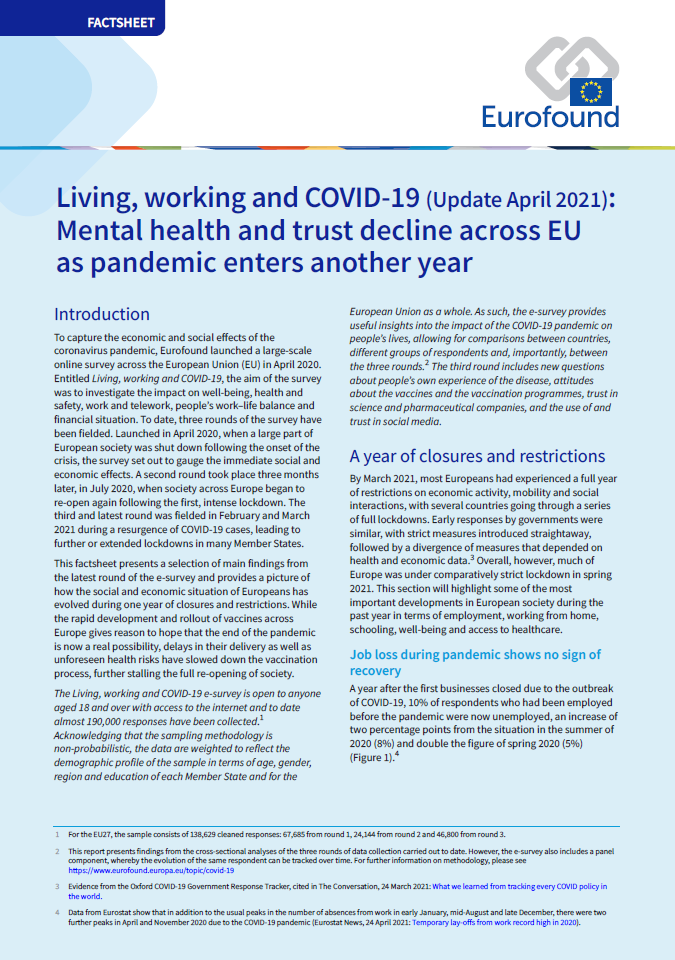
Az Eurofound elektronikus felmérésének harmadik fordulója, amelyre 2021 februárjában és márciusában került sor, az európaiak társadalmi és gazdasági helyzetéről ad képet majdnem egy évvel azt követően, hogy a Covid19 miatt korlátozásokat vezettek be. Ez a jelentés áttekinti a fő megállapításokat és nyomon követi az EU 27 tagállamában a 2020. áprilisi első felmérés óta megfigyelhető fejleményeket és trendeket. Pontosan rávilágít azokra a problémákra, amelyek a világjárvány során felszínre kerültek, például a foglalkoztatás munkahelyek megszűnésének kockázatából adódó nagyobb bizonytalanságára, a romló mentális jóllétre, a nemek közötti egyenlőség terén az utóbbi időben elért eredmények romlására, az intézményekbe vetett bizalom csökkenésére, a munka és a magánélet közötti egyensúly rosszabbodására és a védőoltásokkal szembeni bizalmatlanság növekedésére. A felmérés eredményeiből kiviláglik, hogy a válság által súlyosan érintett csoportok támogatása holisztikus megközelítést igényel annak megelőzése érdekében, hogy e csoportok még nehezebb helyzetbe kerüljenek.
Key findings
A mentális jóllétet tekintve valamennyi korcsoportban minden eddiginél rosszabb a helyzet a világjárvány több mint egy évvel ezelőtti kitörése óta. Ez főként a fiatalok és azok körében szembetűnő, akik elveszítették az állásukat.
Minthogy a világjárvány a veszélyeztetett csoportokat aránytalanul jobban sújtotta, erősödnek a meglévő egyenlőtlenségek. A felmérés eredményeiből az derül ki, hogy lényegesen nehezebben boldogulnak azok, akiknek eleve bizonytalan volt a megélhetése.
Drasztikusan romlott a polgárok elégedettsége a válságkezelő intézkedésekkel, a 2020. nyári 22%-kal szemben most mindössze 12% érzi méltányosnak a támogató intézkedéseket. Csökkent azoknak az aránya is, akik úgy gondolták, hogy könnyű támogatáshoz jutni és a támogatás hatékony, 2020 nyarán 16% vélekedett így, 2021 tavaszán már csak 10%. Majdnem minden tizedik válaszadónak utasították már el pénzügyi támogatás iránti kérelmét.
Nagyot zuhant – a 2020. nyári 4,6-ről 2021 tavaszán 3,9-re – az intézmények, különösen a nemzeti kormányok iránti bizalom. Valamennyi tagállamban a világjárvány kezdetén mért szint alá esett a nemzeti kormányokba vetett bizalom. Az EU-val szembeni bizalom is csökkent, de továbbra is nagyobb, mint a nemzeti kormányok esetében.
Az európaiak több mint egynegyede jelezte, hogy bizalmatlan a Covid19-oltóanyagokkal szemben, ez az arány nagyobb a férfiak (29%), mint a nők (25%) körében. A védőoltásokkal szembeni bizalmatlanság erősen összefügg a kevés bizalommal és a közösségi média használatával, azokban az országokban, ahol kevésbé bíznak a kormányban, nagyobb a védőoltásokkal szembeni bizalmatlanság.
Explore the dataset for each round of the survey.
The data cover a range of topics under seven main headings: quality of life, democracy and trust, work and teleworking, the financial situation and security of respondents, the quality of public services, the employment support measures put in place, as well as the willingness of Europeans to be vaccinated during COVID-19.
- Data: Quality of life during COVID-19
- Data: Democracy and trust during COVID-19 (new in round 3)
- Data: Working during COVID-19
- Data: Financial situation and security during COVID-19
- Data: Quality of public services during COVID-19
- Data: Support measures during COVID-19 (new in round 3)
- Data: Vaccinations during COVID-19 (new in round 3)
The report contains the following lists of tables and figures. The corresponding data for the tables and figures is available as an Excel download (328KB .xlsx).
List of tables
- Table 1: Location of work and average hours worked during the pandemic, EU27 (%)
- Table 2: Proportion of parents declaring they are too tired after work to do household jobs, EU27 (%)
- Table 3: Proportion of respondents reporting having negative feelings by age and gender, EU27 (%)
- Table 4: Request for support by employment status, EU27 (%)
- Table 5: Proportion of financially fragile respondents by employment status, EU27 (%)
- Table 6: Proportion of respondents reporting difficulties making ends meet by employment status, EU27 (%)
- Table 7: Proportion of respondents reporting arrears by group, EU27 (%)
- Table 8: Trust in the EU by sociodemographic group (mean scores), EU27 (%)
- Table 9: Trust in the national government and the EU by financial support (mean scores), EU27 (%)
List of figures
- Figure 1: Respondents who lost their job (of those who were employed before the pandemic) by country, EU27 (%)
- Figure 2: Preference to work from home post-pandemic, EU27 (%)
- Figure 3: Proportion of parents declaring they would like more online schooling for their children, even when the pandemic is over, EU27 (%)
- Figure 4: Risk of depression by age group and survey round, EU27 (%)
- Figure 5: Unmet need for healthcare during the pandemic by country, EU27 (%)
- Figure 6: Unmet need for healthcare by type of healthcare, spring 2021, EU27 (%)
- Figure 7: Requests for different types of support measures, summer 2020 and spring 2021, EU27 (%)
- Figure 8: Views about pandemic support measures, summer 2020 and spring 2021, EU27 (%)
- Figure 9: Views about pandemic support measures by country, spring 2021, EU27 (%)
- Figure 10: Proportion of respondents reporting difficulties making ends meet by country, EU27 (%)
- Figure 11: Pessimism about financial situation by economic situation, EU27 (%)
- Figure 12: Proportion of respondents stating that their financial situation will get worse, EU27 (%)
- Figure 13: Trust in institutions (mean scores), EU27 (%)
- Figure 14: Trust in the EU by country (mean scores), EU27 (%)
- Figure 15: Trust in national governments by country and survey round, EU27 (%)
- Figure 16: Stated intention to take vaccine by country, EU27 (%)
- Figure 17: Sociodemographic characteristics of people with vaccine hesitancy in Europe, EU27 (%)
- Figure 18: Reasons for vaccine hesitancy, EU27 (%)
- Figure 19: Trust in institutions among people who are vaccine hesitant and non-hesitant, EU27 (%)
- Figure 20: Vaccination hesitancy before and after 11 March 2021, EU27 (%)
- Infographic: Living, working and COVID-19
